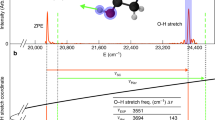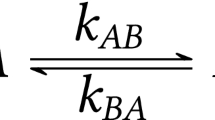Abstract
THE results given here follow on from an earlier communication in which it was reported that treatment of certain methacrylate polymers with nitric oxide gas induced an electron spin resonance signal1. It was later found that pure polymethyl methacrylate powder did not give a signal on treatment, and Law and Ebert2 have suggested that the observed signal was due to traces of monomer in the polymer sample.
This is a preview of subscription content, access via your institution
Access options
Subscribe to this journal
Receive 51 print issues and online access
$199.00 per year
only $3.90 per issue
Buy this article
- Purchase on Springer Link
- Instant access to full article PDF
Prices may be subject to local taxes which are calculated during checkout
Similar content being viewed by others
References
Cook, P. D., Ebert, M., and Mallard, J. R., Nature, 198, 579 (1963).
Law, J., and Ebert, M., private communication.
Fermi, E., Z. Physik., 60, 320 (1930).
Pake, G. E., Townsend, J., and Weissman, S. I., Phys. Rev., 85, 682 (1952).
Author information
Authors and Affiliations
Rights and permissions
About this article
Cite this article
McBRIERTY, V., COOK, P. A Nitrogen-14 Triplet and Nitrogen-15 Doublet as a Standard for Electron Spin Resonance Hyperfine Splitting Determinations. Nature 205, 1197–1198 (1965). https://doi.org/10.1038/2051197b0
Published:
Issue Date:
DOI: https://doi.org/10.1038/2051197b0
This article is cited by
Comments
By submitting a comment you agree to abide by our Terms and Community Guidelines. If you find something abusive or that does not comply with our terms or guidelines please flag it as inappropriate.



